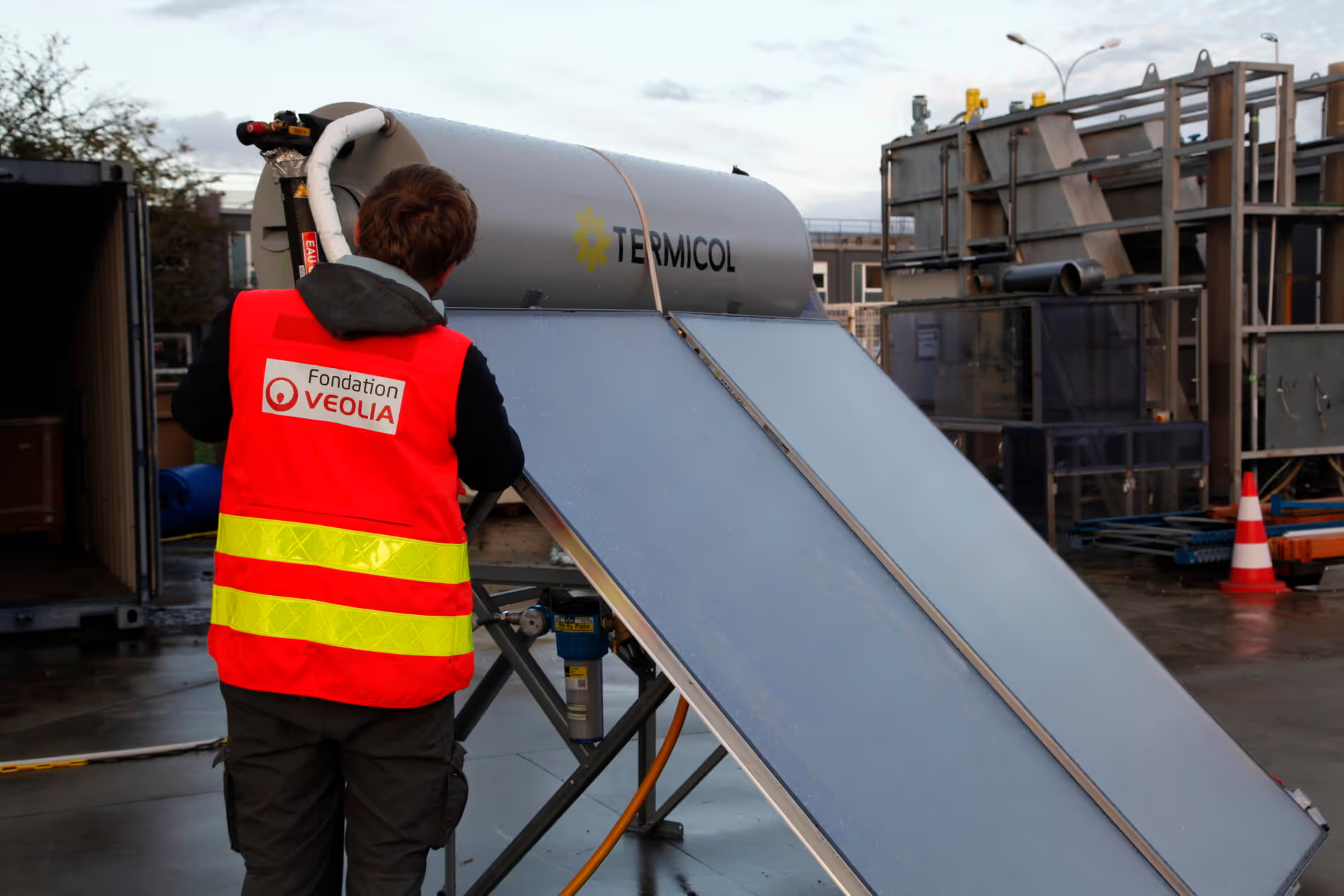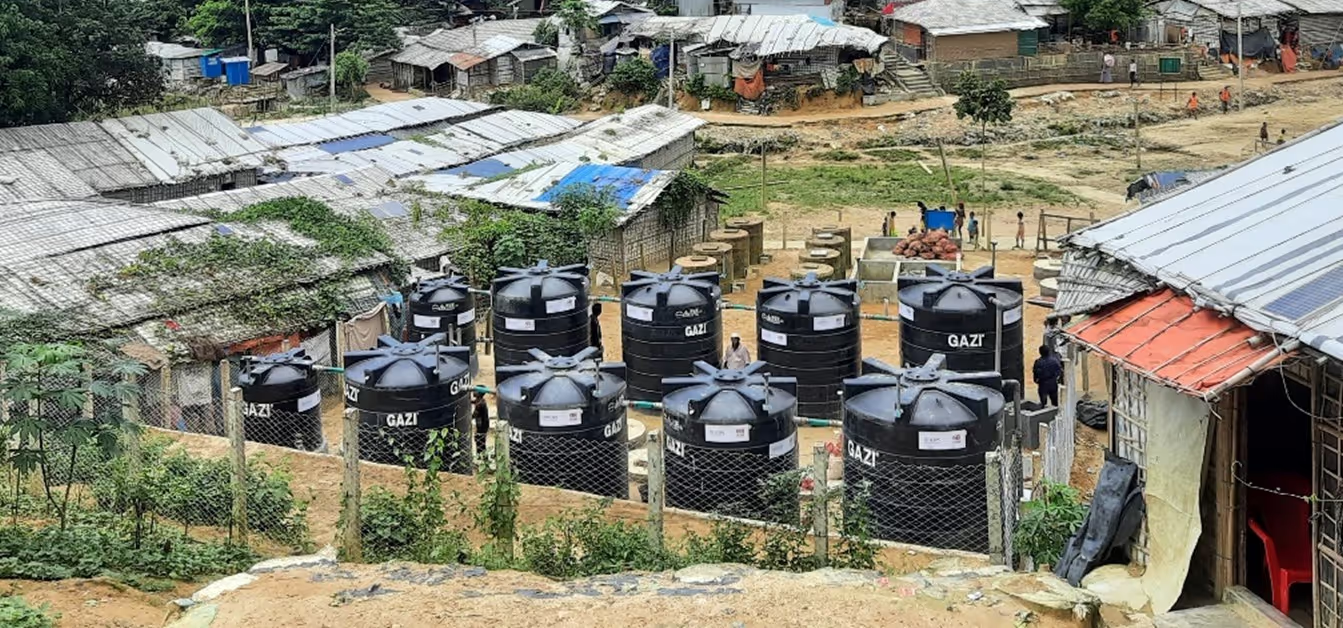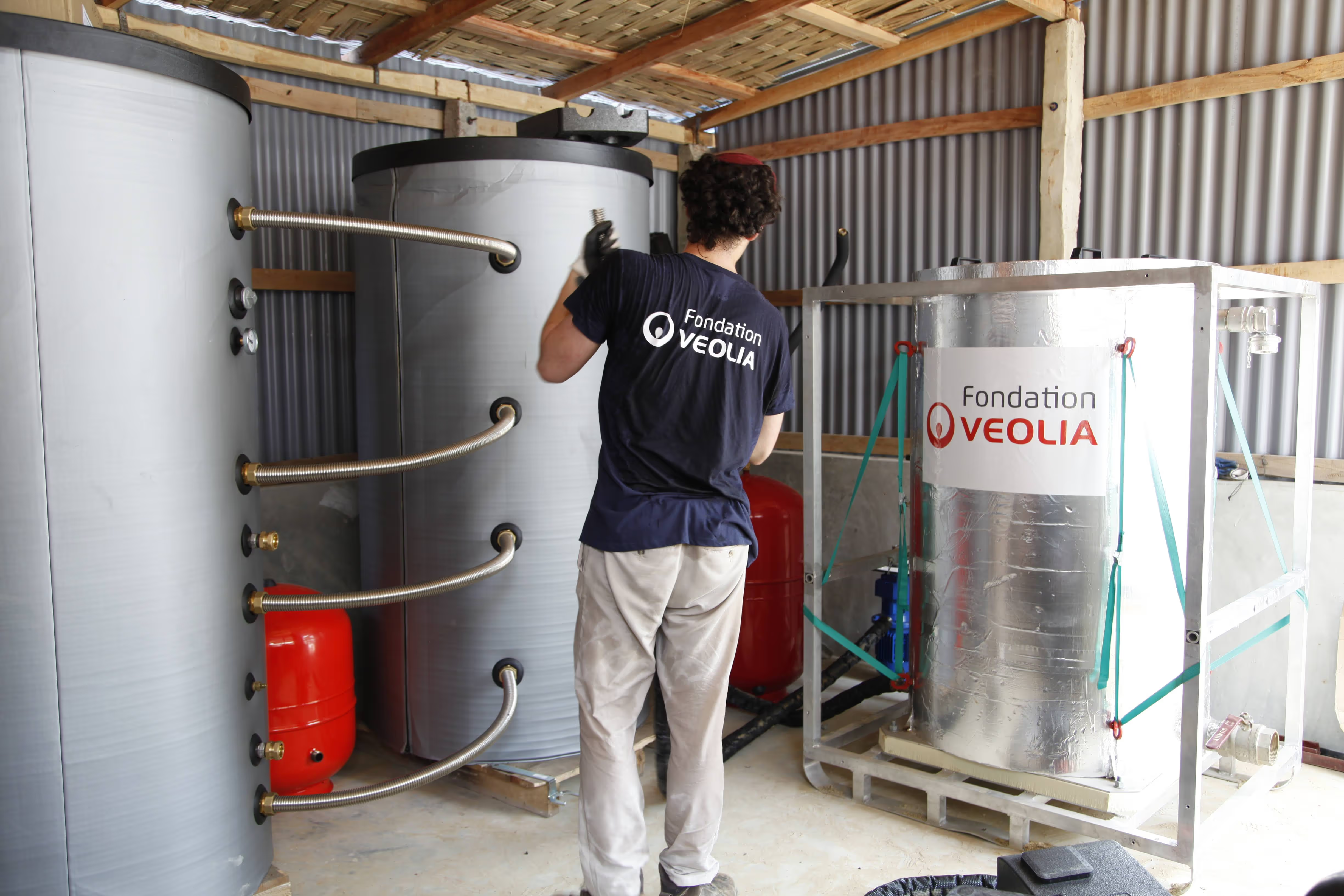Promoting Effluent Pasteurization for Cholera Prevention in Rohingya Refugee Camps

Project overview
IOM worked with partners to evaluate the effectiveness of pathogen reduction for existing and upgraded IOM Decentralized Wastewater Treatment System (DEWATS) in Camp 12 of Cox's Bazar, Bangladesh. Veolia Foundation adapted its innovative technology: the skid of pasteurization with solar heating system to the existing DEWATS. The International Centre for Diarrhoeal Disease Research, Bangladesh (ICDDR,B), was engaged to monitor specific pathogen reduction and effluent parameters to gather evidence on innovative solutions. The pilot demonstrated solar thermal pasteurizers potential to improve wastewater treatment and reduce cholera risk, especially in densely populated humanitarian settings and healthcare facilities where pathogen loads are high.
Countries
Bangladesh
Organisations
IOM
Partners
International Centre for Diarrhoeal Disease Research, Bangladesh (ICDDR’B) , Veolia Foundation
Area of funding
Humanitarian Innovation
Grant amount
First Grant = £170,000
, Second Grant (current) = £18,000
Start date
01
February
2023
End date
30
November
2024
Project length (in months)
First Grant = 22.3 months, Second Grant (current) = 6 months
Focus areas
Topics
No items found.
Status
Closed
Project solution
This project offers [specific solution or intervention] to tackle [challenge]. By implementing [strategies, tools, or innovations], the project aims to achieve [desired outcomes]. The approach is designed to [specific actions or methods] to bring about meaningful change in [community, region, or issue area].
Expected outcomes
This project aims to achieve [specific outcomes], such as [measurable results, improvements, or changes]. The expected impact includes [benefits to the target community, advancements in research or innovation, or long-term effects]. By the end of the project, we anticipate [specific changes or milestones] that will contribute to [broader goals or objectives].
No items found.
WHAT HUMANITARIAN NEED WAS ADDRESSED?
In highly congested settings, such as the Rohingya camps, WASH actors face challenges to deliver faecal sludge treatment processes which provide an effective removal of pathogens. The challenges are compounded by limited space, which constrains the ability to include appropriate, safe and sustainable (cost efficient) aerobic processes in the treatment train. This project addressed the urgent need for innovative, space-efficient and easy-to-operate faecal sludge treatment in Camp 12 Cox's Bazar by exploring pasteurization as a reliable method for pathogen inactivation, improving infection prevention and control. The solar heating systems were found to be particularly effective against cholera, which has implications for broader public health, environmental protection, and sustainability by offering a scalable solution in crisis-affected areas.
WHAT APPROACH WAS TAKEN TO BUILD EVIDENCE, AND HOW DID IT SUPPORT SCALING?
The project adopted a rigorous research approach to develop and validate the solar thermal pasteurization solution. This process began with a comprehensive literature review, followed by laboratory testing and field trials to evaluate pathogen inactivation across varying temperatures and exposure times. The pasteurization skid, installed and commissioned by the Veolia Foundation, was complemented by training for staff and partner organizations.
Collaboration with ICDDR,B facilitated systematic testing of both influent and effluent samples, with data collection encompassing pathogen removal, energy consumption, and overall system performance. These insights informed techno-economic and scalability assessments, providing a robust evidence base that supported the transition to a larger, ECHO-funded project aimed at scaling the innovation in South Sudan.
Project findings were shared widely through global webinars and WASH networks, confirming the solution’s viability for broader adoption in diverse humanitarian and urban health contexts. Results further highlighted the potential to adapt Cholera Treatment Centers and Units (CTCs/CTUs) by offering a safer, scalable, and sustainable alternative to conventional chlorine-based IPC protocols.
WHAT PROGRESS WAS ACHIEVED AND WHAT WERE THE KEY LEARNINGS?
The project successfully installed and optimized a solar thermal pasteurization system at the IOM DEWATS facility in Camp 12 of the Rohingya refugee camps. Laboratory and field testing confirmed the system’s effectiveness in inactivating pathogens, particularly Vibrio cholerae, thereby supporting safer wastewater treatment.
Key milestones included a partnership with the Veolia Foundation to implement its technology, collaboration with ICDDR,B for pathogen analysis, and the completion of a detailed techno-economic and replicability assessment. The project faced challenges such as logistical delays and the need to adapt the system to field conditions, which informed future design refinements.
Testing demonstrated that the solar pasteurizer effectively destroys pathogens, including Vibrio cholerae, at temperatures as low as 50°C, while the “safety zone” for complete pathogen deactivation was identified at 65°C for 60 minutes or 70°C for 15 minutes.
The project showed strong potential for scaling in other humanitarian contexts and healthcare facilities, with feasibility studies conducted for South Sudan, Nigeria, and Mozambique. Complementary innovations, such as Veolia’s biogas-powered version in Uganda, further support broader adoption of the technology, demonstrating its adaptability and potential to provide safe, sustainable, and scalable wastewater treatment solutions across diverse humanitarian and healthcare contexts.
FUTURE POTENTIAL AND LESSONS FOR INNOVATION
This project has demonstrated that solar thermal pasteurization is a safe, scalable, and sustainable solution for infection prevention and control (IPC), particularly in cholera treatment settings. With support from ECHO, the technology will continue to evolve through replication in diverse contexts, such as South Sudan.
Looking ahead, the innovation shows strong potential for use in healthcare facilities, where pathogen loads are high and IPC is crucial. Future directions include developing hybrid systems that combine solar and gas to boost treatment capacity, integrating real-time pathogen monitoring sensors, and creating mobile units for desludging trucks. These advancements can strengthen IPC measures across key points of the sanitation chain.
Key lessons from this work highlight the importance of co-creation with local actors, adaptability to different contexts, and robust stakeholder engagement to ensure integration into policy and protocols. Continued partnerships and innovation labs will be essential to expand impact and drive global adoption.
DISSEMINATION
01/07/2025-31/12/2025
The objective of the dissemination grant is to engage key national and global stakeholders to promote the solar pasteurization innovation and explore its integration into cholera IPC protocols.
In South Sudan, the project will engage the national WASH Cluster, Ministry of Health, and health organisations through meetings and bilateral discussions to gather feedback and recommendations.
At the global level, the project will increase visibility by developing targeted materials such as videos, case studies, and technical briefs, and sharing them through platforms including Sanihub and social media. Dissemination efforts will also include academic seminars with universities such as the University of Cape Town and Stellenbosch University.
Together, these activities aim to support future adaptation, improve understanding, and encourage wider adoption of the innovation in humanitarian contexts.
No items found.
Project delivery & updates
Stay up to date with the latest developments from this project. Here, you will find details on what has been delivered, resources created, and regular updates as the project progresses. Access key documents, reports, and other materials to see how the project is making an impact.
No resources/updates have been published yet for this project. Sign up for our newsletter to stay informed about upcoming publications and updates!
Join our Newsletter
Resources
No items found.
Latest updates
No items found.



